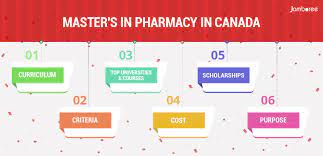Certainly, let’s delve a bit deeper into the programs offered by a couple of these universities:
Dalhousie University (Nova Scotia):

Program: Dalhousie’s College of Pharmacy offers graduate programs in Pharmaceutical Sciences with research areas including pharmacokinetics, drug metabolism, and pharmaceutical outcomes research.
Website: Dalhousie College of Pharmacy
Memorial University of Newfoundland:

Program: The School of Pharmacy at Memorial University offers graduate programs in Pharmaceutical Sciences with research opportunities in areas such as drug design, natural products, and clinical pharmacy practice.
Website: School of Pharmacy – Memorial University
University of Saskatchewan:

Program: The College of Pharmacy and Nutrition at the University of Saskatchewan provides graduate programs in Pharmacy with research areas including drug delivery, pharmacokinetics, and clinical pharmacy.
Website: College of Pharmacy and Nutrition – University of Saskatchewan
McGill University (Quebec):

Program: The Faculty of Pharmacy at McGill University offers graduate programs in Pharmaceutical Sciences with research areas including medicinal chemistry, pharmacology, and pharmacy practice.
Website: Faculty of Pharmacy – McGill University
Laval University (Quebec):

Program: The Faculty of Pharmacy at Laval University provides graduate programs in Pharmaceutical Sciences with research opportunities in areas such as bioorganic chemistry, pharmacogenetics, and pharmacoepidemiology.
Website: Faculty of Pharmacy – Laval University
When exploring these programs, it’s essential to review specific admission requirements, faculty profiles, and research opportunities to determine which university and program align best with your academic and career goals. Contacting the admissions offices or program coordinators for any additional details or specific inquiries is also recommended.
Certainly! Here are more details about the pharmacy programs at additional Canadian universities along with their respective websites:
University of Manitoba:
Program: The College of Pharmacy at the University of Manitoba offers graduate programs in Pharmaceutical Sciences with research areas such as drug development, pharmacotherapy, and clinical pharmacy.
Website: College of Pharmacy – University of Manitoba
University of Calgary:
Program: The Faculty of Pharmacy and Pharmaceutical Sciences at the University of Calgary provides graduate programs in Pharmaceutical Sciences with research opportunities in areas such as pharmacoepidemiology, drug discovery, and pharmacy practice.
Website: Faculty of Pharmacy and Pharmaceutical Sciences – University of Calgary
University of Western Ontario:
Program: The School of Pharmacy at the University of Western Ontario offers graduate programs in Pharmaceutical Sciences with research areas including drug delivery, pharmacology, and pharmacy practice.
Website: School of Pharmacy – Western University
University of Toronto:
Program: The Leslie Dan Faculty of Pharmacy at the University of Toronto offers graduate programs in Pharmaceutical Sciences with research opportunities in drug development, pharmacology, and pharmacy practice.
Website: Leslie Dan Faculty of Pharmacy – University of Toronto
University of British Columbia (UBC):
Program: UBC offers a Master of Pharmaceutical Sciences program with various specializations, including pharmacy practice, pharmaceutics, and medicinal chemistry.
Website: UBC Pharmaceutical Sciences
University of Waterloo:
Program: The School of Pharmacy at the University of Waterloo provides graduate programs in Pharmacy with research opportunities in drug discovery, health outcomes, and pharmacy practice.
Website: School of Pharmacy – University of Waterloo
It’s advisable to visit the provided links for the most up-to-date information and to contact the respective universities directly for any specific inquiries.
It’s always a good idea to check the latest details on the official websites of the universities or contact them directly, we provide you the best information and you would not be able to get confused as you have a lot of options to watch on.
Fees for Masters in Pharmacy:
Tuition fees for graduate programs in Canada can vary widely. As of my last update, the fees for international students could range from CAD 10,000 to CAD 30,000 per year, depending on the university and program. These fees do not include living expenses, health insurance, and other additional costs.
The tuition fees for Master’s in Pharmacy programs in Canada varied widely depending on the university, program, and whether the student is a domestic or international student. Here’s a general range based on my last available data:
- Domestic Students (Canadian Citizens and Permanent Residents):
- Tuition fees for domestic students typically ranged from approximately CAD 5,000 to CAD 15,000 per year. However, this can vary by program and university.
- International Students:
- For international students, tuition fees were generally higher, ranging from approximately CAD 10,000 to CAD 30,000 per year. Again, this can vary significantly depending on the institution and the specific program.
Scope of Masters in Pharmacy in Canada:
A Master’s in Pharmacy in Canada opens up various career opportunities. Graduates can work in areas such as:
Clinical Pharmacy: Working in hospitals or clinics, collaborating with healthcare professionals to ensure proper medication management.
Research and Development: In pharmaceutical companies or research institutions, focusing on drug discovery and development.
Regulatory Affairs: Ensuring compliance with regulations and standards in the pharmaceutical industry.
Community Pharmacy: Working in retail settings, providing patient care and medication counseling.
Academia: Teaching and research positions in universities and research institutions.
Canada has a robust healthcare system, and the demand for skilled pharmacists is expected to remain strong. However, it’s important to consider factors such as work permits and immigration regulations if you plan to stay and work in Canada after completing your studies.
Please note that fees and program details may have changed, and it’s crucial to verify the information from the official websites of the respective universities. Additionally, consider checking with the Canadian government’s immigration website for the latest information on work permits and immigration regulation.
Conclusion
In conclusion, pursuing a Master’s in Pharmacy in Canada can offer a wealth of opportunities for academic and professional development. Canada is home to several reputable universities with strong pharmacy programs, providing a diverse range of research opportunities and specialization areas. Some of the top universities for pharmacy programs in Canada include the University of British Columbia, University of Toronto, University of Alberta, and others.
When considering these programs, it’s essential to research each university’s specific offerings, faculty expertise, and research opportunities to align with your academic and career goals. Tuition fees for Master’s in Pharmacy programs vary widely, with domestic and international students facing different fee structures. It’s crucial to check the official websites of the universities for the most up-to-date and accurate information on program costs and admission requirements.
Furthermore, the completion of a Master’s in Pharmacy in Canada opens up various career paths, including roles in clinical pharmacy, research and development, regulatory affairs, community pharmacy, and academia. The demand for skilled pharmacists in Canada remains strong, making it an attractive destination for those seeking advanced education in pharmacy.
Before making any decisions, prospective students should contact the admissions offices of the universities they are interested in for the latest information on program details, admission requirements, and tuition fees. Additionally, staying informed about immigration regulations and work permit options is crucial if you plan to work in Canada after completing your studies.




